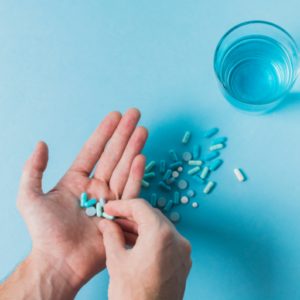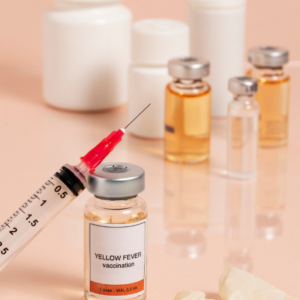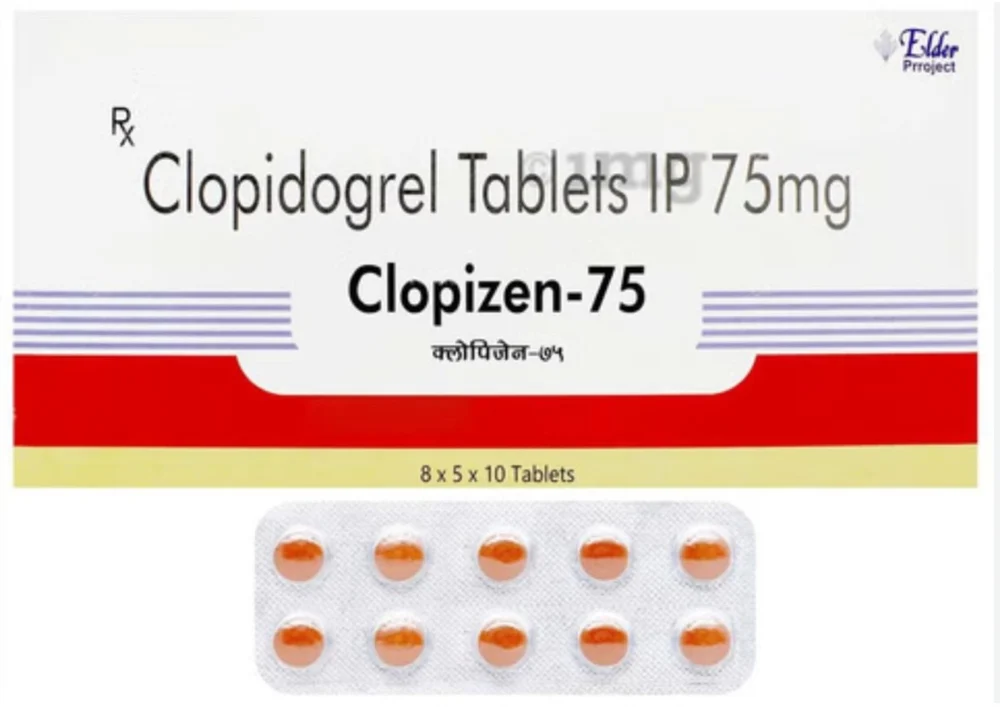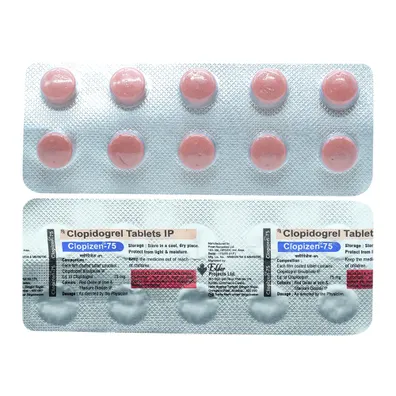Clopizen 75mg
| Package | Per tablet | Savings | Price |
|---|---|---|---|
| 180 tablets | $0.15 | $9 | $36 $27 |
| 150 tablets | $0.15 | $7 | $30 $23 |
| 120 tablets | $0.16 | $5 | $24 $19 |
| 90 tablets | $0.17 | $3 | $18 $15 |
| 60 tablets | $0.18 | $1 | $12 $11 |
| 30 tablets | $0.20 | – | $6 |
What is this medicine?
CLOPIZEN (Clopidogrel 75 mg) is an antiplatelet medication. It helps prevent blood clots by stopping platelets from clumping together. This medicine is used to reduce the risk of heart attacks, strokes, and other complications in patients with acute coronary syndrome, recent myocardial infarction, stroke, or peripheral arterial disease.
What should I tell my health care provider before I take this medicine?
They need to know if you have any of these conditions:
-
Active bleeding problems such as stomach ulcers or bleeding in the brain
-
Blood disorders like thrombocytopenia or hemophilia
-
History of stroke or transient ischemic attack (TIA)
-
Liver disease
-
Kidney disease
-
Allergy to clopidogrel or similar medications
-
If you are taking other blood thinners or NSAIDs
-
If you are scheduled for surgery or dental procedures
-
If you are pregnant or trying to get pregnant
-
Breast-feeding
How should I use this medicine?
Take this medicine by mouth, with or without food, once daily, or as directed by your doctor. Take it with a full glass of water.
Take your doses at regular intervals. Do not take more than directed. Do not stop taking this medicine unless advised by your doctor.
Overdosage: If you think you have taken too much of this medicine, contact a poison control center or emergency room right away.
What if I miss a dose?
If you miss a dose, take it as soon as you remember. If it is almost time for your next dose, skip the missed dose and take only your regular scheduled dose. Do not take double or extra doses.
What may interact with this medicine?
-
Aspirin or other NSAIDs (e.g., ibuprofen, naproxen)
-
Warfarin, heparin, or other anticoagulants
-
Omeprazole, esomeprazole (may reduce clopidogrel’s effectiveness)
-
SSRIs or SNRIs (e.g., fluoxetine, sertraline)
-
Rifampin
-
Phenytoin
-
Herbal supplements like ginkgo biloba, garlic (in large amounts), or turmeric
This list may not include all possible interactions. Share a complete list of the medications, herbal supplements, and over-the-counter products you use with your doctor or pharmacist.
What should I watch for while using this medicine?
-
Visit your doctor regularly to monitor your response.
-
Inform all healthcare providers and dentists that you are taking this medicine.
-
Use caution to avoid cuts or injuries as this medicine may increase bleeding risk.
-
Limit alcohol use, as it can increase the risk of stomach bleeding.
-
Report any signs of unusual bleeding or bruising immediately.
-
Do not stop the medicine abruptly without medical advice.
-
If undergoing surgery, your doctor may instruct you to stop the medication several days beforehand.
-
Women who are pregnant or planning to become pregnant should consult their doctor before using this medicine.
What side effects may I notice from this medicine?
Side effects to report to your doctor or health care provider right away:
-
Unusual bleeding or bruising
-
Blood in urine or black, tarry stools
-
Vomiting blood or material that looks like coffee grounds
-
Jaundice (yellowing of the skin or eyes)
-
Rash, itching, or swelling of the face, lips, or throat (allergic reaction)
-
Fever, fatigue, or signs of low white blood cell count
Side effects that usually do not require medical attention (but report if persistent):
-
Headache
-
Diarrhea
-
Indigestion
-
Dizziness
-
Minor nosebleeds or gum bleeding
This list may not describe all possible side effects. Always consult your doctor or pharmacist if any symptoms are concerning.
Where should I keep my medicine?
-
Keep out of reach of children.
-
Store at room temperature between 20 and 25 degrees C (68 and 77 degrees F).
-
Protect from heat and moisture.
-
Do not store in the bathroom.
-
Discard any unused medicine after the expiration date.

























